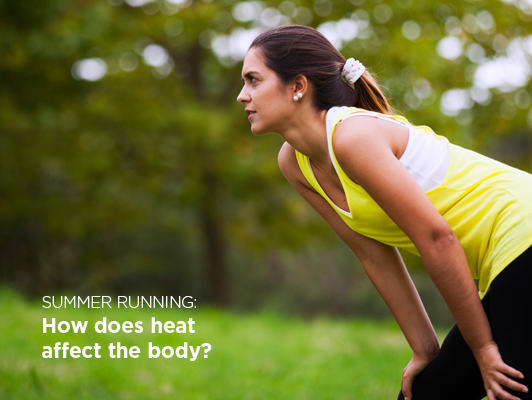Summer running: How does heat affect the body?
Summer is a great time to run outdoors, but the heat and humidity can make it challenging. The warmer weather can affect not only your body, but also your performance.
Here’s what happens to your body during exercise in the heat:
- Changes in blood flow and sweating. Your body has the ability to cool itself by sweating. For sweating to occur, blood is diverted to the surface of the skin (blood is a major carrier of heat). This increased blood flow to the skin can be problematic, since less blood is going to the working muscles and vital organs. This makes exercise more difficult.
- Heart must work harder. With more blood flowing toward the skin surface, less is going to the heart. To compensate, heart rate increases to sustain the workload. That’s why you may find you max out sooner in the heat. For example, an eight-minute pace may feel like a six-minute pace because your heart is working that much harder.
- Working muscles suffer. The active muscles are not getting as much blood, either. That means less of the fuel muscles need to sustain long aerobic endurance exercise: oxygen. Without oxygen, your body shifts from aerobic to anaerobic modes to produce energy, causing muscle fatigue more quickly due to accumulation of lactate.
- VO2 max decreases. VO2 max is the maximum amount of oxygen that the body can take in and use to fuel working muscles. The heart is working hard, but the muscles are not getting enough oxygen-rich blood.
- Humidity hinders cooling. Relative humidity is the amount of water in the air. Our body cools itself through sweating when the sweat evaporates. However, when the humidity is high, the more saturated the air is — and the harder it is for sweat to evaporate. With less evaporation, we don’t cool as well.
Exercise in the heat and humidity costs you more energy and can lead to a decrease in performance. However, once you adjust to the heat, it can actually make you a better runner! Your cardiovascular function improves — less stress is placed on the heart, resulting in a decrease in heart rate.
Your body gets better at sending blood from your core to the skin, helping to dissipate heat, and working muscles. You will also start sweating sooner to improve the cooling process.
It may be difficult at first, but these adaptations can improve your efficiency and performance. The next post in this series will explain how to embrace the heat.




